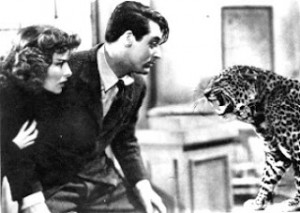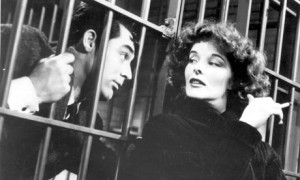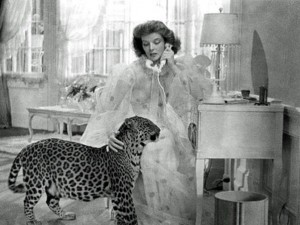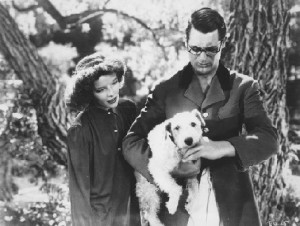The screenplay was adapted by Dudley Nichols and Hagar Wilde from a short story by Wilde, which had appeared in Collier’ magazine on April 10, 1937.
 Bringing Up Baby follows this format: It begins with a scattered-brain but abrasive heiress, Susan Vance (played to the hilt by Katharine Hepburn, who get top billing), who has a dog named George, and a leopard named Baby.
Bringing Up Baby follows this format: It begins with a scattered-brain but abrasive heiress, Susan Vance (played to the hilt by Katharine Hepburn, who get top billing), who has a dog named George, and a leopard named Baby.As expected, Grant ends up falling for Hepburn–as the New Yorker critic Pauline Kael wrote, “no paleontologist ever got hold of a more beautiful set of bones.”
For some critics, Bringing Up Baby may be the the closest equivalent of American movies to a British Restoration comedy.
Casting:
 This was Hepburn and Grant’s second teaming out of four film together, three of which were for director George Cukor, Sylvia Scarlett (1937), Holiday (1938) and The Philadelphia Story (1940).
This was Hepburn and Grant’s second teaming out of four film together, three of which were for director George Cukor, Sylvia Scarlett (1937), Holiday (1938) and The Philadelphia Story (1940).
It should be noted that neither Hepburn nor Grant were the first intended choices. Director Hawks initially considered Carole Lombard for the role of Susan Vance, and the part of Huxley was offered and then rejected by Robert Montgomery, Fredric March, and Ray Milland.
Grant’s Gay Line
 There has been an ongoing debate of whether Bringing Up Baby is the first feature to use the word “gay” in a homosexual context. In one scene, Grant’s David is wearing a woman’s negligee; when asked why, he replies exasperatedly “Because I just went gay all of a sudden!” (jumping at the word “gay”). The term “gay” did not become familiar to the general public until the Stonewall riots in 1969, so it is debated whether the word was used in its original sense (meaning “happy”) or is an intentional reference to homosexuality.
There has been an ongoing debate of whether Bringing Up Baby is the first feature to use the word “gay” in a homosexual context. In one scene, Grant’s David is wearing a woman’s negligee; when asked why, he replies exasperatedly “Because I just went gay all of a sudden!” (jumping at the word “gay”). The term “gay” did not become familiar to the general public until the Stonewall riots in 1969, so it is debated whether the word was used in its original sense (meaning “happy”) or is an intentional reference to homosexuality.
The line was an ad-lib by Grant; it’s not in any version of the original script. According to Vito Ruso in his seminal book, The Celluloid Closet, the script originally had David say “I suppose you think it’s odd, my wearing this. I realize it looks odd…I don’t usually…I mean, I don’t own one of these.” For Russo, this suggests that people in Hollywood (especially in Grant’s circles) were familiar with the slang connotations of the word. However, neither Grant nor anyone else suggested this.
Critical Status, Then and Now
Surprisingly, the film was not a major hit when first released; made on a budget of 1.1 million, it barely recouped its expense. Bringing up Baby was moderately successful in some big cities, like New York and San Francisco. However, eventually the movie made a small profit after its re-release in the early 1940s, and then again in the 1950s.
However, shortly after the film’s premiere, Hepburn was labeled box-office poison by the Theatre Owners of America and would not regain her success until The Philadelphia Story, two years later, for which she was nominated for the Best Actress Oscar.
The film’s reputation began to grow during the 1960s, when it was shown on TV. At present, the film is considered one of the the definitive screwball comedies and one of the fastest, funniest, and craziest American films ever made.
In reassessing the picture, the late, great Canadian critic Robin Wood stressed the film’s singular appeal, summed up in the central idea of the “lure of irresponsibility.” It’s a film in which middle-class work ethic is portrayed as joyless and boring, when contrasted with the glamorous lifestyle of the rich, who live luxurious lifestyles in grand homes with servants and maids serving elegant dinners.
Equally important is the fast speed and madcap tone of the endless adventurous proceedings, offering enjoyable but not mindless escapism, which Katharine Hepburn (herself a product of rich and reputable family) embodies in language and (mis)conduct.
When contrasted with Grant’s fiancée, a responsible but dull woman devoted to her man’s career, Hepburn makes it clear that fun and pleasure with a woman who might be ditzy and irresponsible, is far more seductive and pleasurable.
The glorious supporting cast includes Charles Ruggles as an explorer; Barry Fitzgerald as a drunk; May Robson as a dowager, Walter Catlett as a sheriff, and Fritz Feld as a frenzied psychoanalyst.
 George is played by Hollywood celebrity dog, Asta, who built a name for himself in the Thin Man film series.
George is played by Hollywood celebrity dog, Asta, who built a name for himself in the Thin Man film series.
Director Hawks keeps the trifling nonsense in such a fast speed and artful balance that you never have time to think about the problems of the Great Depression, the context in which the film was made.
Deconstructing Masculinity:
Seen from today’s perspective, it’s hard not to notice the process of changing the stodgy male image of Grant’s absent-minded professor. It is done through a series of rituals of masculine humiliation, in which Grant is stripped, literally and figuratively, of his straight masculine image. In one scene, he is wearing a woman’s robe, and when questioned about it, “Why are you wearing these clothes?” he says, jumping: “Because I suddenly went gay!
Reel Impact
Bringing Up Baby served as a taking-off point for Peter Bogdanovitch’s 1972 comedy, What’s Up Doc, with Ryan O’Neal and Barbra Streisand.
Cast
Katharine Hepburn as Susan Vance
Cary Grant as Dr. David Huxley (alias Mr. Bone)
May Robson as Elizabeth Carlton Random, Susan’s aunt
Charles Ruggles as Major Horace Applegate, a big-game hunter
Walter Catlett as Constable Slocum
Barry Fitzgerald as Aloysius Gogarty, Mrs. Random’s gardener
Fritz Feld as Dr. Fritz Lehman, an affluent psychiatrist
Virginia Walker as Alice Swallow, David’s fiancée
George Irving as Alexander Peabody, Mrs. Random’s lawyer
Leona Roberts as Hannah Gogarty, Aloysius’ wife and Mrs. Random’s servant
Tala Birell as Mrs. Lehman, Dr. Lehman’s wife
John Kelly as Elmer, Constable Slocum’s assistant
D’Arcy Corrigan as Professor LaTouche
Billy Bevan as Tom, the barkeeper
Billy Franey as the butcher
Dick Lane as Circus manager
Ward Bond as a motorcycle policeman
Jack Carson as a circus roustabout
Skippy as George, Mrs. Random’s dog
Nissa as Baby and the circus leopard
Credits
Directed by Howard Hawks
Produced by Cliff Reid, Howard Hawks
Screenplay by Dudley Nichols, Hagar Wilde, Robert McGowan (uncredited), Gertrude Purcell (uncredited); Story by Hagar Wilde Based on Bringing Up Baby, 1937 short story in Collier’s
by Hagar Wilde
Music by Roy Webb (musical director), Jimmy McHugh, Dorothy Fields (writers of I Can’t Give You Anything but Love, Baby)
Cinematography Russell Metty
Edited by George Hively
Production company: RKO Radio Pictures
Distributed by RKO Radio Pictures
Release date: February 16, 1938 (Golden Gate Theatre); November 23, 1938 (US)
Running time: 102 minutes
Budget $1.1 million
Box office $1.1 million
Note
I am grateful to TCM for showing this film recently.





